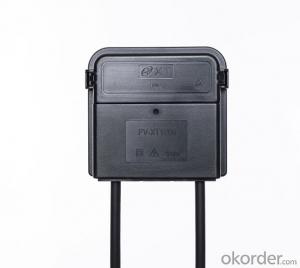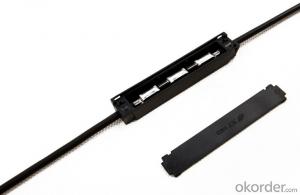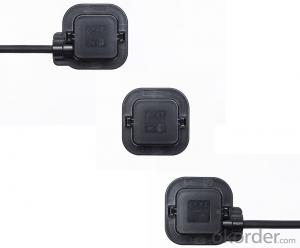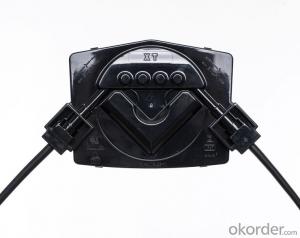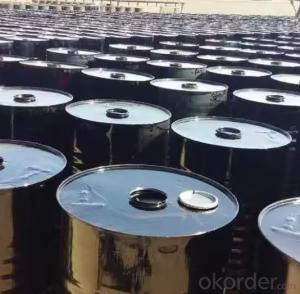PV Juction Box >> PV-1206 TUV、UL 、 ISO9001 Certification
- Loading Port:
- Guangzhou
- Payment Terms:
- TT OR LC
- Min Order Qty:
- 3000 pc
- Supply Capability:
- 3000000 pc/month
OKorder Service Pledge
OKorder Financial Service
You Might Also Like
Feature
a.small volume, compact structure
b. good heat output, stable and reliable
c. waterproof and excellent Dustproof performance
d. solder connection, low contact resistance
Product description
1. All the connection made by double fixed connection low power loss
2. With the capacity of anti-aging and resistance to ultraviolet radiation on the outer cover with excellent box design with good thermal dissipation
3. Demonstrating safe, realiable and excellent lasting functionality, applicable in harsh outdoors working ambient
4. Big variety for choices,1 rail ,2 rail,3 rail,4 rail,5 rail,6 rail.mini junction box and solar junction box for solar street light
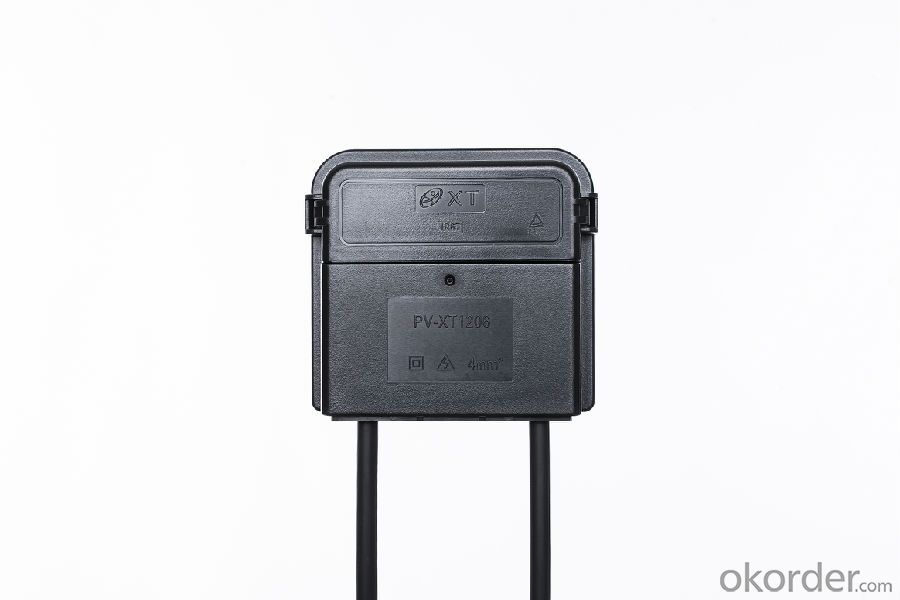
Item | Data |
Terminals for Ribbons | 4 |
Rated Current | 12A |
Rated Voltage | 1000V |
Dimension | 84*78*18mm |
Temperature | -40℃~+85℃ |
Size of Cables | 4 mm2/12AWG |
Size of Ribbons | W(6±2mm)*T(0.3±0.15mm) |
Protection Degree | IP67 |
Flammability Class | V-0 |
FAQ
1. How long will my inquiry get response?
Your inquiry related to our products or prices will be replied within 24 hours.
2. Can I get professional service and suggestion?
Well-trained and experienced staffs to answer all your questions in fluent English.
3. Do you accept OEM or customized design?
OEM & ODM, any your customized lightings we can help you to design and put into product.
4. What if I need specific design?
Distributorship are offered for your unique design and some our current models.
- Q:Can solar energy systems be used for powering electric bikes or scooters?
- Yes, solar energy systems can be used to power electric bikes or scooters. Solar panels can be used to generate electricity, which can then be stored in batteries and used to charge the batteries of electric bikes or scooters. This allows for a clean and sustainable way to power these vehicles.
- Q:How do solar energy systems handle power outages?
- Solar energy systems handle power outages differently depending on their type. Grid-tied systems, connected to the utility grid, do not supply power during an outage to prevent feeding energy back into the grid and protect workers. In contrast, off-grid systems operate independently and can provide power during outages. They consist of solar panels, a charge controller, a battery bank, and an inverter. Sunlight is collected and converted to electricity, stored in the battery bank, and then converted to usable AC electricity. The amount of power available during an outage depends on the battery bank's capacity. If fully charged and with sufficient capacity, it can provide power for a period of time. However, extended outages or limited sunlight may deplete the system's power supply. In summary, while grid-tied systems don't provide power during outages, off-grid systems can serve as reliable sources, provided they have enough battery capacity and sunlight for recharging.
- Q:Can solar energy systems be used for powering off-grid islands?
- Yes, solar energy systems can be used for powering off-grid islands. Solar panels can be installed on rooftops or open spaces to harness sunlight and convert it into electricity. This renewable energy source can provide a reliable and sustainable power supply for off-grid islands, reducing their dependence on fossil fuels and decreasing their carbon footprint. Additionally, advancements in battery storage technology allow excess solar energy to be stored and used during cloudy periods or at night, ensuring a continuous power supply.
- Q:How do solar energy systems impact the energy consumption of a commercial building?
- Solar energy systems have a significant impact on the energy consumption of a commercial building. By harnessing the power of the sun, these systems generate clean and sustainable electricity, reducing the reliance on traditional energy sources. This not only lowers the carbon footprint of the building but also leads to substantial cost savings on electricity bills. Additionally, solar energy systems can provide a reliable and consistent power supply, ensuring uninterrupted operations even during grid outages.
- Q:Can solar energy systems be used in powering banks or financial institutions?
- Yes, solar energy systems can certainly be used to power banks or financial institutions. Solar panels can be installed on the rooftops or premises of these establishments to generate electricity from sunlight. This renewable energy source can help reduce the reliance on traditional fossil fuel-based power, lower energy costs, and contribute to a greener and more sustainable operation for banks and financial institutions.
- Q:Can solar energy systems be used in educational settings for teaching purposes?
- Yes, solar energy systems can definitely be used in educational settings for teaching purposes. They provide hands-on learning experiences for students to understand the principles of renewable energy, sustainability, and environmental conservation. Solar energy systems can be integrated into science, technology, engineering, and math (STEM) curricula, allowing students to explore concepts such as photovoltaics, solar panels, energy conversion, and energy efficiency. Additionally, these systems offer practical applications that engage students in real-world problem-solving and empower them to become environmentally conscious individuals.
- Q:Can solar energy systems be used in powering street lights?
- Indeed, street lights can be powered by solar energy systems. In recent years, the popularity of solar-powered street lights has increased significantly due to their numerous advantages. By utilizing solar panels, sunlight is converted into electricity, which is then stored in batteries for later use. This stored energy is subsequently employed to illuminate the street lights during the night. There are various benefits associated with utilizing solar energy systems for street lights. Firstly, it offers a clean and renewable energy source, thereby reducing reliance on fossil fuels and minimizing the carbon footprint. Additionally, solar street lights eliminate the need for extensive cabling and grid connections, making them more cost-effective and easier to install in remote or off-grid areas. Moreover, solar-powered street lights operate independently of the electricity grid, ensuring continuous lighting even during power outages. Furthermore, solar-powered street lights are highly efficient and require minimal maintenance. The advancements in solar technology have enhanced the panels' ability to convert sunlight into electricity, ensuring optimal performance of the street lights. Furthermore, the batteries used to store solar energy have a long lifespan and necessitate minimal upkeep, thereby reducing overall operational costs. In conclusion, solar energy systems offer a sustainable and viable solution for illuminating street lights. They provide reliable and uninterrupted lighting while decreasing the environmental impact and operating expenses associated with traditional grid-powered street lights.
- Q:What is a solar thermal system?
- A solar thermal system is a technology that uses sunlight to heat water or other fluids for various applications such as heating buildings, providing hot water, or generating electricity. It involves capturing solar energy using collectors, typically mounted on rooftops, and transferring it to a storage tank or heat exchanger where it can be used or converted into usable energy.
- Q:Can solar energy systems be used in areas with limited roof access for maintenance?
- Yes, solar energy systems can be used in areas with limited roof access for maintenance. While it is more common to install solar panels on rooftops for optimal sun exposure, there are alternative options available. Ground-mounted solar panels can be installed in areas where roof access is limited, allowing for easier maintenance and cleaning. Additionally, solar panel systems can also be integrated into other structures such as carports or pergolas, providing an alternative to traditional rooftop installations. These alternatives ensure that solar energy systems can be utilized effectively in areas with limited roof access for maintenance.
- Q:Can solar energy systems be used in powering electric fences or security systems?
- Certainly, electric fences or security systems can be powered by solar energy systems. The conversion of sunlight into energy by solar panels enables the generation of electricity, which can be stored in batteries or used directly to operate different devices. This renders solar energy systems a feasible and sustainable alternative for powering electric fences or security systems, particularly in remote or off-grid areas where conventional power sources may not be accessible or dependable. Solar-powered electric fences effectively discourage intruders or confine animals within a specific area, while solar-powered security systems provide continuous surveillance and monitoring without the requirement of a constant electricity supply. Moreover, solar energy systems are eco-friendly and aid in reducing carbon emissions related to traditional power sources, thus becoming an increasingly sought-after and cost-efficient solution for diverse applications, including electric fences and security systems.
1. Manufacturer Overview |
|
|---|---|
| Location | |
| Year Established | |
| Annual Output Value | |
| Main Markets | |
| Company Certifications | |
2. Manufacturer Certificates |
|
|---|---|
| a) Certification Name | |
| Range | |
| Reference | |
| Validity Period | |
3. Manufacturer Capability |
|
|---|---|
| a)Trade Capacity | |
| Nearest Port | |
| Export Percentage | |
| No.of Employees in Trade Department | |
| Language Spoken: | |
| b)Factory Information | |
| Factory Size: | |
| No. of Production Lines | |
| Contract Manufacturing | |
| Product Price Range | |
Send your message to us
PV Juction Box >> PV-1206 TUV、UL 、 ISO9001 Certification
- Loading Port:
- Guangzhou
- Payment Terms:
- TT OR LC
- Min Order Qty:
- 3000 pc
- Supply Capability:
- 3000000 pc/month
OKorder Service Pledge
OKorder Financial Service
Similar products
New products
Hot products
Related keywords
